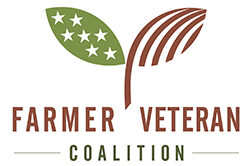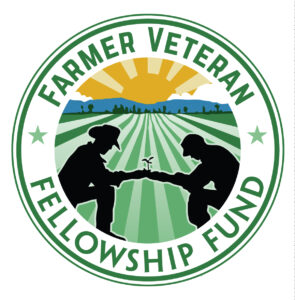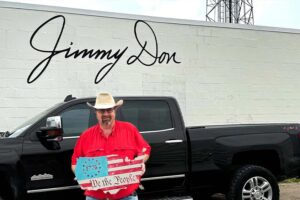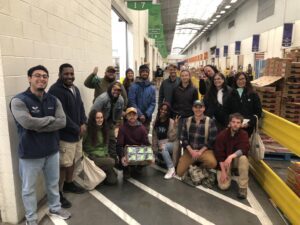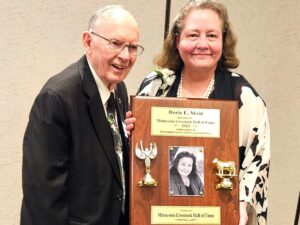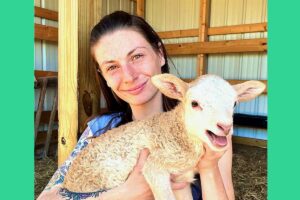How a military career led this Seattle-area nurse to farming, Farmer Veteran Coalition and now a FVC Washington Board Member
In 2021, the field near Interstate 5 was overwhelmed with invasive grasses. Today, thanks in large part to McCarthy, it is filled with the beginnings of intentional, edible plants nestled in three dozen raised garden beds. The 30-something Second Lieutenant from Seattle never expected to become a farmer, let alone see gardening as the thing she builds her life around. But in the process of pursuing the Army nursing career she had aspired to since high school, farming became her passion.
“After encountering the garden last year, I couldn’t stop thinking, this could be such a better place if we could just get people excited about coming out and gardening. It’s really been therapeutic for me,” she says, her muck boots squelching near her beds of chard, cabbage and sunflowers, ahead of attending a garden work party and the location’s first-ever gardening tutorial that morning.
McCarthy is trying to make that practice more accessible to her community on base, and she’s doing it with support from JBLM staff and military veterans drawn to nurturing themselves and others by nurturing the earth.
Mangoes and onions
McCarthy, who joined the Army straight out of high school to gain medic skills and earn money to pay for a nursing degree, landed in a reserve unit at JBLM in 2008. While going back and forth between JBLM and assignments in Alaska and Africa, she had no idea there were community gardens on base. Launched in the 1970s, the JBLM gardens had been mostly well-loved and tended up until the pandemic, when invasive grasses began to creep in.
Her deployment as a medic to Djibouti in 2012 for a humanitarian mission with a civil affairs unit opened her eyes to farming and conservation. While developing relationships with locals so the military could retain access to a strategic area, her team interacted with a particularly engaging farmer. In addition to growing mangoes and onions, this man also served as caretaker of an endangered antelope preserve next door, and was creating an agritourism business to introduce people to his work. McCarthy and her colleagues helped spread awareness of the preserve, so that local shepherds wouldn’t graze their goats there and would stop burning trees that the antelopes needed for food.
Getting to know the area under the mentorship of this farmer and preserve caretaker, Kayla got hooked on working in the dirt. “That was the first time in my life where I learned that farmers are really genius, intuitive people,” she says. “Not only are they farming and growing food, but they have their hands dipped in a lot of different things.”
When she returned home, she started a weekly work-share program at Jubilee Farm in Carnation. “I started to just love this work so much, I convinced them to let me do a work-share in the offseason,” she said.
For seven years, while getting her nursing degree, McCarthy’s life revolved around the farm. It dictated her eating: As a single person living alone in an expensive city, McCarthy figured out how to freeze, ferment and dehydrate produce, until she achieved essentially her entire diet from manual labor with no money exchanged.
Farming at Jubilee deepened her desire not only to farm, but to farm professionally in the state she grew up in.
“My dad jokes, ‘If I knew that you’re going to do this, I would have had you in 4-H as a kid,’ ” she says.
Healing while growing
After earning her nursing degree and being reassigned to JBLM a year ago as an active duty nurse, she wondered briefly if farming had just been a phase. She didn’t share her passion with others in the military, thinking they might not understand. But as an Army nurse, she noticed similarities between her medical work and gardening. Both focus on preventive care.
Desperate to get her hands back in the soil, McCarthy discovered an opportunity right under her nose. An online search revealed the Lewis North Community Garden, and she rented a plot for a year for $25.
But the gardens were in a state. Gardening felt isolating at first, and she struggled, unsure who to go to about water leakages, equipment failures, grazing deer, invasive grasses and mysterious compost piles. Before she could plant anything, she had to pull up waist-high weeds. One of the biggest gardening challenges for military members: keeping the plants watered and growing while they are training elsewhere.
But having any opportunity to garden was invaluable to her well-being. Military members have so little control over their workdays and so many competing priorities that having something as straightforward and rewarding as food gardening can really complement their lives.
“It gives me something tangible … that nourishes me,” she says, amid go-go-go military training. In contrast to nursing in a sterile environment, manual labor is dirty and can be solitary.
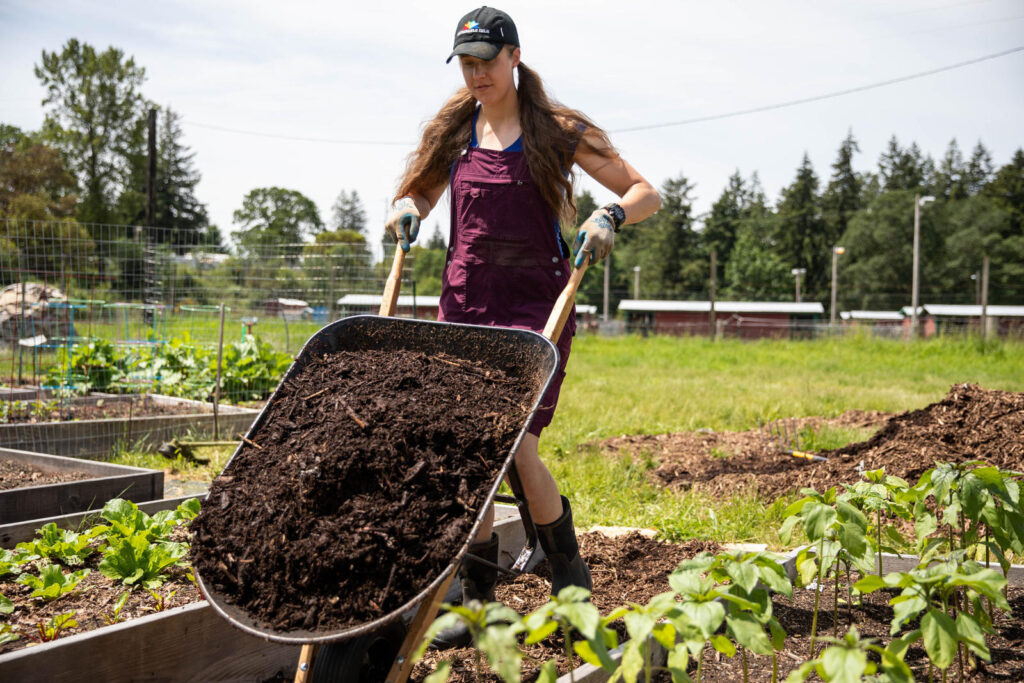
And as an Army nurse privy to the vulnerability of the human body, gardening makes her appreciate even more the ability to do hard things.
“In the military, it’s all about using what you have to get the job done,” she says. “If you’re in a position, and the Army puts you there, then even if you don’t believe in yourself, there’s someone else that believes in you.”
McCarthy wants to leave the garden better than when she found it, and to make it easier for other people to enjoy something that brought her so much comfort — and skills to fall back on when she eventually leaves the military.
“I feel like as soldiers are ready to transition out of the military, there’s a lot of opportunities for training in different trades … [but] there’s not really a trade school for farming,” McCarthy says.
When McCarthy arrived last year, Maschhoff says, “you could tell this was going to be a place that she found meaning and connected with people and had ideas.” She found meaning in encouraging McCarthy, who brought vision and eventually became a volunteer manager supporting the garden revitalization and expansion.
Farming is networking
Anything on a military installation necessarily involves a lot of red tape, and there are many parties involved in this effort — from the base’s Department of Public Works, to Earthworks, to Sustainability JBLM, to the base’s Department of Fish and Wildlife. Eager to get the garden off the ground, Kayla started volunteering for and building relationships with departments involved in every aspect of the garden, from leak repairs to compost delivery. Something as simple as getting a port-a-potty delivered required months of negotiation. “That was a big victory for us,” she says.
McCarthy started making and leveraging connections around and beyond the base, including in the local military veteran farming community.
While looking for money to build out a fence to better keep out deer, Kayla joined Zoom meetings of the Washington state chapter of the Farmer Veteran Coalition, a group dedicated to helping veterans get into farming. She not only received a $1,000 grant, but an invitation to join the organization’s board.
What’s next
Military lives are nomadic, so McCarthy has been looking for ways to keep the gardens going when she leaves. She has connected with Anderson’s team, Master Gardeners and, recently, with the Association of the U.S. Army, which is interested in leveraging the garden for educational and mentorship purposes, so people can get into gardening more easily.
With an additional $500 grant from Washington State University and increasing demand for garden space, she’s figuring out how to add more beds, an automated drip irrigation system and more. Anderson says that all the beds at the garden, as well as another smaller garden on base, are fully rented out this year, and credits McCarthy with its popularity.
And all the while, McCarthy’s plotting how to create a farm of her own as a first-generation farmer. “I am planting roots on my farm as we speak!” she says, of a one-acre plot she recently leased in the area.
“Having a background in the military and working in health care all my adult life, it’s really set me up for success,” McCarthy says. “I’m not scared of a challenge. I’m not scared to go out and fight for something that I believe in.”
Full article By Hannah Weinberger; can be found here:https://crosscut.com/environment/2022/06/how-military-career-led-seattle-area-nurse-farming?fbclid=IwAR00OCeql6HYAMH6NSsvu1BL-BDVSONCWLqMXa2kUil7gjX90CrTvFpPRdA
